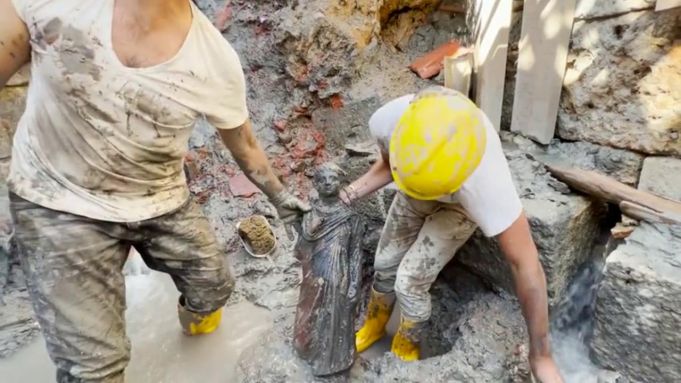San Casciano discovery hailed as "most important since Riace Bronzes".
Archaeologists in Italy have unearthed 24 ancient bronze statues at the San Casciano dei Bagni thermal bath site in a discovery described as "exceptional" by Italy's culture minister Gennaro Sangiuliano.
The perfectly intact statues emerged from the mud and water at the bottom of a large Roman pool in the hilltop town, about 160 km north of Rome, reports Italian news agency ANSA.
Dating to between the second century BC and the first century AD, the statues include representations of divinities including Apollo and Hygieia, as well as emperors, matrons and ephebes.

The statues, five of which are almost one metre high, were discovered alongside six thousand coins in gold, silver and bronze, votive offerings and inscriptions in Etruscan and Latin, all preserved safely by the mud.
Archaeologist Jacopo Tabolli from the University for Foreigners in Siena has led the project for the last three years, with support from Italy's culture ministry and local authorities, and the collaboration of more than 60 experts from around the world.
Dalle acque termali il rinvenimento più grande mai emerso in Italia, riscriverà la storia della statuaria etrusca-romana. Il Ministro @g_sangiuliano: «Ritrovamento eccezionale, Italia ricca di tesori immensi e unici». Scopri di piùhttps://t.co/lGXtExc5Ii / #MiC #glideidelfango pic.twitter.com/Xhz3RvjSYf— Ministero della Cultura (@MiC_Italia) November 8, 2022
The ancient bath complex is believed to have existed from at least the third century BC and its sacred waters remained in use until the fifth century AD, Tabolli told ANSA.
In Christian times the site was closed down - but not destroyed - and its treasures were immersed in the hot thermal waters of the pools which were sealed with stone.
Describing it as "a discovery that will rewrite history" about the transition from the Etruscan civilisation to the Roman Empire, Tabolli hailed the trove as "the greatest store of statues from ancient Italy and in any case the only one whose context we can wholly reconstruct."
Tabolli said the find was significant as it shed new light on the end of the Etruscan civilisation and the rise of the Roman empire in today’s central Italy between the second and first centuries BC.
"The discovery allows us to completely rewrite the relationship between these two peoples" said Tabolli, adding that there was "no clear division between the two cultures".
Instead the bronze statues show evidence that Etruscan and Roman families prayed together to deities in the sacred sanctuary which represented a “unique multicultural and multilingual haven of peace, surrounded by political instability and war”, the culture ministry said.
Culture minister Gennaro Sangiuliano applauded the "exceptional discovery that confirms once again that Italy is a country full of huge and unique treasures".
VIDEO | Jacopo Tabolli, archeologo per l'Università per Stranieri di Siena descrive lo straordinario ritrovamento: "Si tratta di un momento di passaggio in Etruria, dalla dominazione etrusca a quella romana, ci sono infatti iscrizioni in latino e in etrusco". #ANSA pic.twitter.com/fgcZbTNIAk— Agenzia ANSA (@Agenzia_Ansa) November 8, 2022
Director general of Italy's state museums Massimo Osanna said the find represents "the most important discovery since the Riace Bronzes and certainly one of the most significant discovery of bronzes ever made in the history of the ancient Mediterranean".
Osanna has approved the purchase of a 16th-century building to house the new-found statues in San Casciano, with plans to create an archaeological park in the area in the future, ANSA reports.
In the meantime excavation work will stop for the winter, before resuming in the spring, while experts carry out restoration and studies on the newly emerged treasures.
Photos ANSA
General Info
View on Map
Italy discovers 24 ancient bronze statues in thermal baths
53040 San Casciano dei Bagni SI, Italy

















